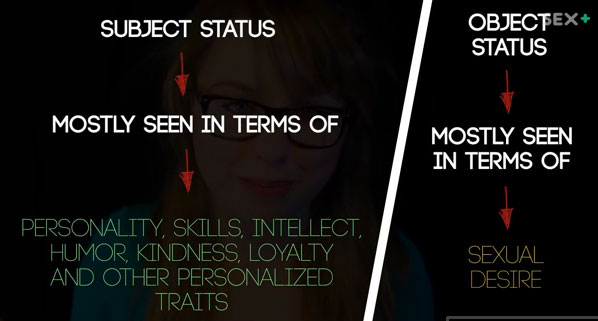I’ve long been meaning to write a huge essay on the concept of “objectification” and how it applies to porn. Specifically the way that it bugs me that it’s the standard anti-porn response: “But porn objectifies women!” Everyone loves saying that but there’s no deeper discussion of what the word means or how it applies in porn and to wider society. Nor is there a discussion of the way sexual fantasy sometimes requires objectification and why that’s not necessarily a bad thing.
Advertisement

Support independent, ethically made, award-winning porn. Bright Desire features all of my erotic films and writing. A membership to Bright Desire gets you access to every movie I've ever made and lets me keep making female friendly porn!
Click here to find out more.
-------------------------------------------------------
But because I’m so busy making porn rather than writing about it, I thought I’d post this because I think it gives a nice overview of the concept of “objectification” without resorting to black and white thinking. It’s far more holistic and wide-ranging in its criticism. Indeed, it’s partly interesting because it doesn’t talk about porn; Laci Green is more interested in the way advertising, movies, TV shows and fashion regularly use objectification of women’s bodies without a second thought.
At 3:25 she says:
“In a sane world – one that we do not live in – everyone would be mostly subjects and occasionally objects. This is actually the status quo for men right now.”
The accompanying graphic says that occasionally seeing a person as an object of sexual desire is OK. I was pleased to see that.

I’ve pointed out in the past that being seen as an object is not something that happens only in the realm of sex and I think that needs to be repeated. We can objectify the person at the supermarket checkout because they become only a means to an end for us. So it’s not a complaint that is specific to porn or media/advertising. I think the real question is: does objectification cause harm. In this video, Laci makes the case that it does but that harm extends from the degree of objectification, not the objectification itself.
Objectification is seen only by critics, and is a form of slut-shaming. The rest of us know full well, that people are people.
There is no complaint about other jobs, where waiters could be seen as servants, domestics as “work objects”, and that’s because the vast majority of people would not insult a worker by suggestion that they can’t decide for themselves.